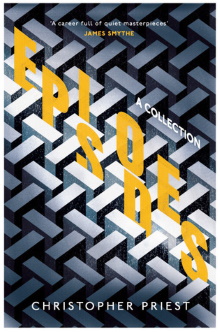
You may not know who Christopher Priest is and I myself have not read anything by him prior to this, but I’d bet that just about everyone knows about at least one of his novels due to it being adapted into the film The Prestige by Christopher Nolan. This book is an anthology of some of his short stories spanning the many decades of his career. What is especially interesting about this collection is that each story is accompanied by a foreword telling something about that story came to be and an afterword recounting the aftermath of its publications. I’m sure that this would be invaluable to other aspiring writers.
Priest describes himself as a writer of fantastic fiction rather than science-fiction and after reading this collection I find that this is very much true. It’s not as Priest notes that his stories aren’t about spaceships and aliens but rather that he uses elements of the fantastic to put characters in stressful situations that showcase extremes of emotion, never to explore the novel element itself. It is not a coincidence that stories that feel most science-fiction often feature engineers and scientists as protagonists given that the intent is to explore the limits and ramifications of whatever some new technology or discovery. Priest has little interest in detailing exactly how things work, for much the same reasons that protagonists in ghost stories don’t spend all their time and effort in performing experiments to determine exactly what ghosts are. Instead his stories are all about his characters reacting with wonder, love, fear and plenty of horror at what is going on. I suppose that this more human but it really is the main reason why his stories don’t feel like science-fiction and is not really to my taste.
A good example of this is the story Palely Loitering, set in a world in which humans apparently possess both time travel and starships, yet society mostly resembles Victorian-era England. A garden with bridges to the past, present and future is a popular attraction for families and a young boy becomes obsessed with using the gates to visit a girl that he has fallen in love with. I often see this cited as being one of the most liked stories in this collection but I just find myself being frustrated at how preposterous the worldbuilding is, up to including the fact that the boy abuses the system merely by jumping from a spot on a bridge without a railing to the far bank. I expected every one of the twists invoked here, because I have read so many time travel stories, but I’m mostly dismayed by how little effort the author puts towards making it all plausible. At the same time, I do get the appeal. It’s all about the imagery of simple bridges crossing a river-like timestream and the magical wonder of being separated by a loved one across time and confronting your past and future selves. But I would argue that being forced to work within the strict confines of an internally consistent system that the reader understands makes for an infinitely better story. I submit as evidence one of my favorite short stories that explore something very similar, Mark Chadbourn’s Where Do You Go When the Lights Go Out?
I do admit that Priest is a fine writer with a much more literary style than most genre writers. His Lovecraft style story I, Haruspex exquisitely sets up a scenario of a recluse who is all that stands between the world and unspeakable demonic horrors, or at least that is how the main character sees it. His being forced to sustain his powers by consuming some truly disgusting medicaments and his abuse of his staff heightens the horror and the strange presence of a Nazi Germany aircraft trapped in time adds weirdness. But as in many of these stories, I don’t quite fully understand what happens at the end as Priest quite deliberately obfuscates the line between the metaphorical and the literal. Then there are the signs that The Prestige was no fluke and that Priest has a fascination with stage performances. The Stooge is a story about being a clueless assistant for a stage magician and The Head and the Hand is very much about a horror version of a modern performance artist. Priest does seem to love the theatrical and personally I feel that he works best as a horror writer. I think my favorite story here would be Shooting an Episode which very much feels like episode of Black Mirror.
As far as I can tell, Priest’s writing isn’t about building worlds or exploring ideas. It’s about painting incredibly vivid imagery and evoking visceral emotions. That’s why it’s funny when he is hired to explore science-fiction ideas but hands in work that must be utterly different from what was expected, as he relates here. It is rather telling that he uses the image of books disordered against the owner’s usual preferences to convey a sense of horror of being violated. Plus of course he writes that he finds topics such as computer security utterly boring. This means that while Priest is a successful author who has found his audience, I find that his work isn’t to my taste at all and I probably will not reading more of it, regardless of how much I love the film version of The Prestige.